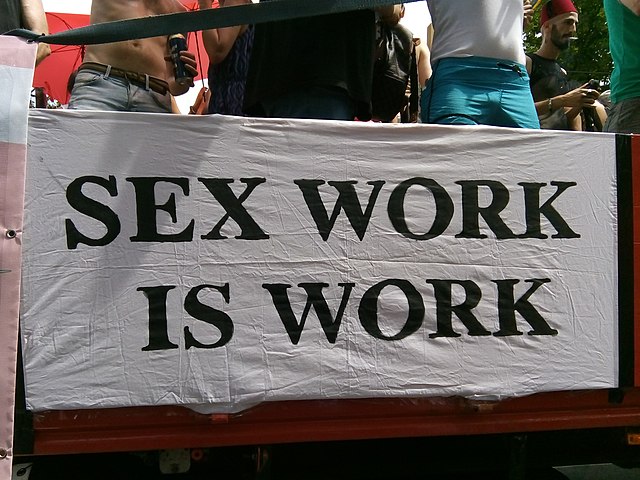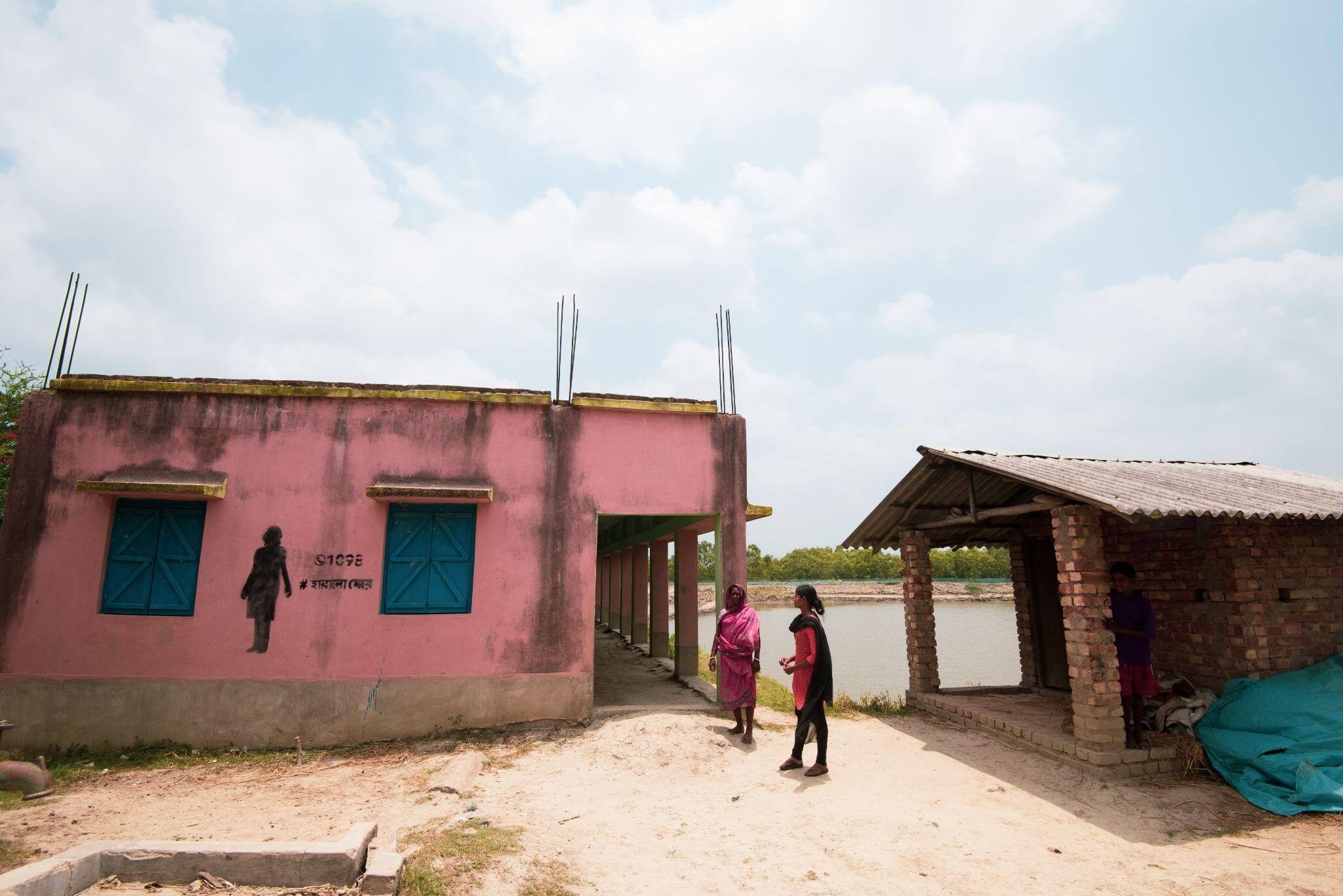Do we call it prostitution? Do we call it sex work?
- Published: December 27, 2020
- Category: Sex Work in India

Image source: Wikimedia Commons
Newman and White in Women Power and Public Policy (2012) argue that feminist perspectives on prostitution agree on three main points: First, they condemn the current legal policy enforcing criminal sanctions against women who offer sex in exchange for money. Second, they agree that authentic consent is the sine qua non of legitimate sex, whether in commercial or non-commercial form. Third, all feminists recognize that commercial sex workers are subject to economic coercion and are often victims of violence, and that little is done to address these problems.
Anti-prostitution feminists hold that prostitution is a practice that is the result of the existing patriarchal societal order. They argue that prostitution has a very negative effect, both on the prostitutes themselves and on society as a whole, as it reinforces stereotypical views about women, who are seen as sex objects which can be used and abused by men. Prostitution abolitionists also object to the high rates of violence against women in the sex industry. Studies of women in prostitution show an extremely high level of violence is perpetrated against women in prostitution. Women in indoor and outdoor prostitution both report high levels of violence and a constant need for vigilance and fear.
The Marxist perspective of feminism examines prostitution as a result of capitalism. Prostitutes are exploited by the ruling class, which could be considered the patriarchy, and more specifically by the pimp since he receives the direct profit of her labour. Domination theory holds the view that the root of women’s oppression rests in sexuality. It suggests that prostitution is not an industry, but that it is the state in which all women find themselves. The argument is that the sexuality of women is reliant on their objectification by men. Domination-theory feminists believe that prostitution is not a choice by women and that it has nothing to do with women’s desire because in their view sex work is oppressive.
Pro-sex work feminists hold that sex work is a valid choice for women and men who choose to engage in it. In this view, sex work must be differentiated from forced prostitution, and feminists should support sex worker activism against abuses by both the sex industry and the legal system.
Advocates of the pro-sex work perspective hold that sexuality, including paid forms, is consensual in many cases and that a woman should be free to make her own decision regarding the type of work in which she chooses to partake. Similarly, sex positivists argue that the notion of intimacy and what actions or sexual acts are considered intimate should be decided by the woman. The radical sexual-pluralist theory was developed as an opposition to binaries and grand theories on sexuality. It posits that sexuality should not be divided into categories of good and bad, normal, and deviant. To make these distinctions based on one group’s notion of what acceptable sexual behavior or relations are is to marginalize those who fall outside of those boundaries.
Radical feminism does not view prostitution as a victimless crime, but as a situation where men have reduced women to an image of being mere sexual objects. This allows men to unconscionably oppress and coerce women in order to satisfy their own fantasies through prostitution.
The liberal feminist perspective of prostitution varies between those who argue that sex work is degrading and those who believe that it is the same as any other labor that workers perform to earn a wage. The tenet behind this position is that the criminalization of prostitution denies the sex workers the right to make decisions regarding their own bodies.
Materialist feminism has interesting perspectives to offer in terms of sex work being work; the work position. According to the early socialist feminists such as Alexandra Kollontai, sex work was not restricted to the sphere of the sex industry but was also dominant in the private sphere of marriage and also in the workplace wherein women exchanged sex for ‘material’ benefits. Sex rather than their labour due to women’s dependency on men as a result of social inequalities and unequal wages, took precedence giving rise to the phenomenon of ‘sex work’. Kollontai asserted that any relationship involving “material bargaining” was harmful to society and this is further corroborated by Viviana Zelizer in her metaphor of “Hostile Worlds” wherein sex and the market exist in separate dimensions, independent of each other and ‘hostile’ to the other. Thus, there is a clear rejection of prostitution or sex work as ‘work’, especially by the early socialist feminists who believed in the possibility of sex being driven by pure passion and attraction, without any material exchange, irrespective of whether it happens inside or outside the institution of marriage.
Missing Link Trust’s vision is to create a world where every child and woman is safe from sex trafficking. The organisation’s focus has been on prevention of sex trafficking through systematic awareness campaigns and programs and on challenging the status quo – the deep-rooted patriarchal norms, structures and violence.
Through our awareness programs we educate individuals about sex trafficking and the role they play in the disappearance of thousands of girls and women.
We believe that demand creates supply. And sex trafficking is an unmissable element of the supply chain. And that has led us to seek to end demand. Such is our stance and we understand fully well that it is a contested one.
The discourse surrounding sex work/prostitution itself, is a fragmented one, with feminists and activists standing together and apart on varied issues. The main sites of contestation rest on the issues of choice and agency- whether sex work adds to the exploitation and objectification of women and further gender discrimination or if it is, work. At a conceptual, intellectual level, sex work is another form of work but in the larger sense of gender equality, we have found it can become discriminatory or oppressive in terms of power relations.
What do you think? Participate in our poll and tell us your thoughts.
Sources:
https://www.jstor.org/stable/pdf/42979426.pdf?refreqid=excelsior%3A4dae1d459427291e759fc673cdd77e89
https://www.ncbi.nlm.nih.gov/pmc/articles/PMC4730391/
https://scholarship.law.umn.edu/cgi/viewcontent.cgi?article=1140&context=lawineq
https://www.collectionscanada.gc.ca/obj/s4/f2/dsk2/ftp01/MQ47786.pdf

Trafficking And Its Economic Costs – To The Society, The State And The Individual

Addressing The Mental Health Concerns Of Adolescents Within The Anti-trafficking Space
